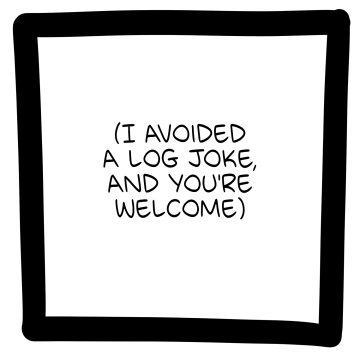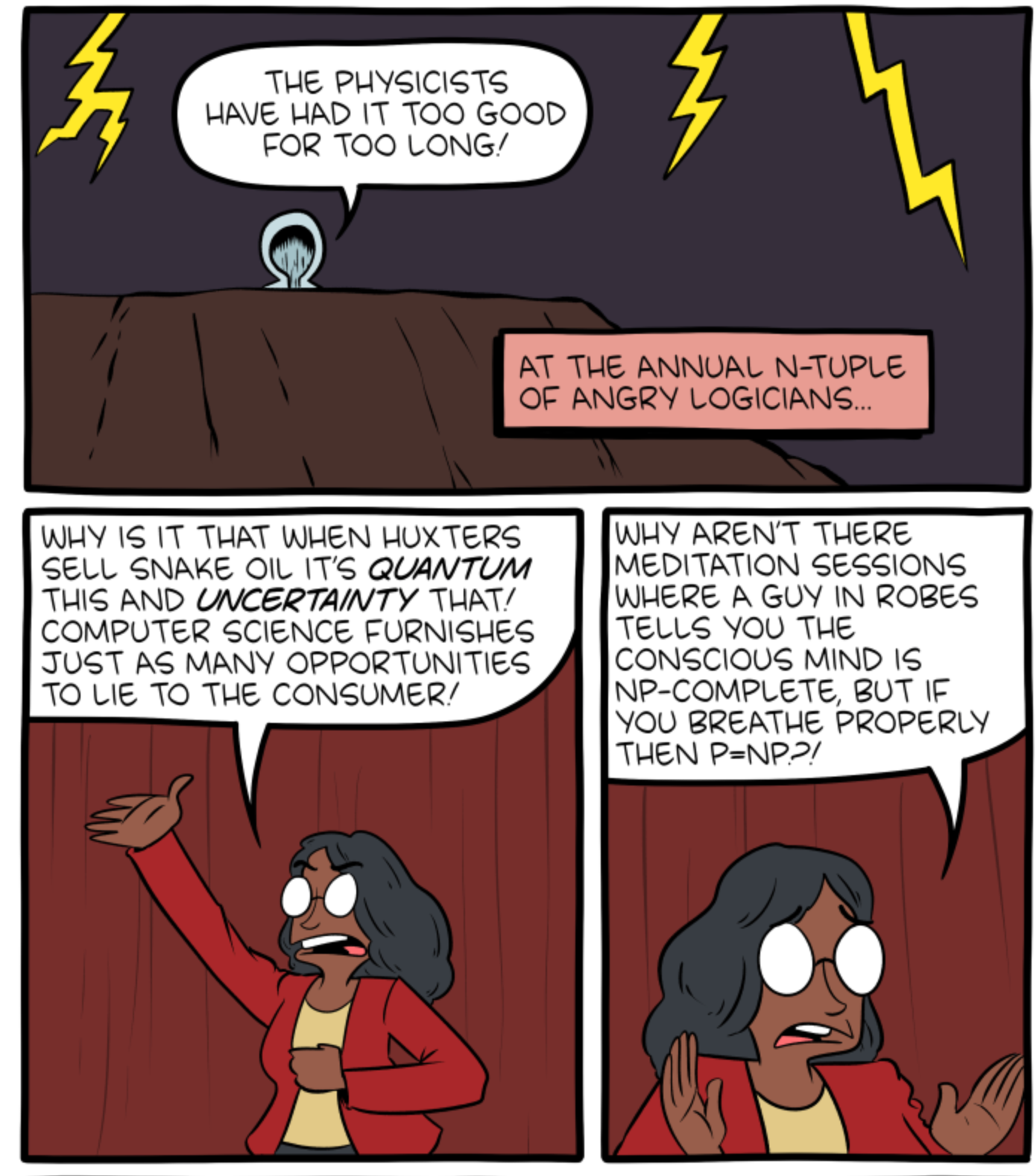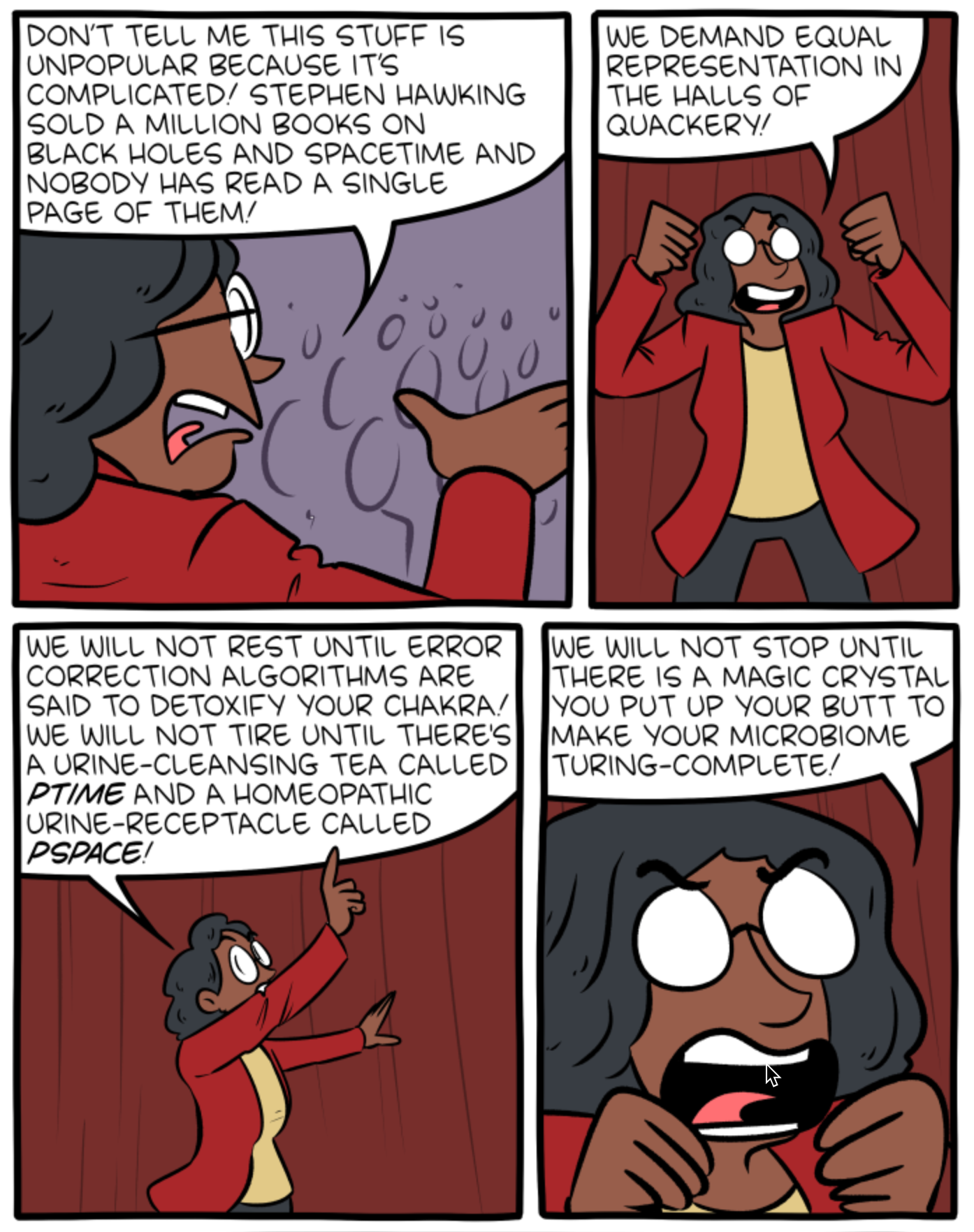Equal representation in the halls of quackery
« previous post | next post »
Today's SMBC starts this way:
The rant continues at some length — I think my favorite parts are the digital chakra-detoxification algorithms and the Turing-complete microbiome (with its obvious connections to nanotechnology, edge computing, message-passing via mRNA, etc.):
The mouseover title [link added]: "As I post this I am suddenly terrified that somewhere in the multiverse, Scott Aaronson already made this joke."
The aftercomic:

I was going to add something about getting linguists into the huxtering game, but then I remembered about Neuro-linguistic Programming. You might complain, fairly, that NLP borrows too few metaphors from the many subdisciplines of linguistics; but John Grinder did what he could, I guess.
And for those who care about such things, huxter is apparently a "dated form of huckster". Among the OED's citations (from the 1899 entry, still not updated):
1851 M. Reid Scalp Hunters I. ix. 122 The women—light-hearted huxters.
1889 Spectator 28 Dec. 921/2 From the great shops in Regent Street and Bond Street to the smallest huxters' in the slums, there are Christmas presents in the windows.
And the OED's etymology:
Etymology: See huck v. Although the series huck, hucker, huckster, corresponds formally with bake, baker, baxter, brew, brewer, brewster, etc., in which the verb is the starting-point, the late date of huck as compared with huckster, and the continental parallels of the latter, make difficulties. Middle Dutch had hokester, hoekster, early modern Dutch heukster, ‘huckster’ feminine; also Middle Dutch hoeker, early modern Dutch heuker (masculine) = Middle Low German hoker, modern German höker, ‘higgler, hawker, retailer, market-man, costermonger’; none of these, however, appear to be known as early as our huckster.
The origin of the Dutch and German words themselves is unsettled; German, besides höker, has höke, höcke, Middle High German hucke, Middle Low German hoke, to be referred, according to Kluge, probably to hocken to squat, sit on the ‘hunkers’; but Verwijs and Verdam state grounds for connecting Middle Dutch hoeker, hoekster rather with Dutch hoek a corner. The history is thus altogether obscure.


John Swindle said,
March 30, 2021 @ 7:29 am
Schwierig machen: "… [T]he late date of huck as compared with huckster, and the continental parallels of the latter, make difficulties." (OED)
X, and Y, make difficulties for Z.
X, and Y, create difficulties.
X, and Y, make difficulties.
To me, American over age 70, the third version feels slightly odd, even apart from the commas. I don't know why.
bks said,
March 30, 2021 @ 8:18 am
With respect to the theme of the comic: _Programming and metaprogramming in the human biocomputer theory and experiments_, John C. Lilly, (1968)
J.W. Brewer said,
March 30, 2021 @ 9:33 am
The variation between huxter and huckster seems akin to that between connexion (now archaic and/or maybe British?) and connection, and there are no doubt other such pairs.
"Huckster" is more pejorative than its etymological doublet "hawker," in the sense of "itinerant vendor," of which the internet says "(c. 1400), agent noun from Middle Low German höken 'to peddle, carry on the back, squat,' from Proto-Germanic *huk-." .
Gregory Kusnick said,
March 30, 2021 @ 10:03 am
It occurs to me that a hooker (i.e. prostitute) is in some sense a hawker or huckster, but etymonline makes no mention of any connection.
Seth said,
March 30, 2021 @ 11:29 am
I suspect in the near future that "Quantum *Computing*", and "AI", are going to go some way to redressing the quackery-gap.
Philip Taylor said,
March 30, 2021 @ 11:48 am
John S — as a Briton of similar age to your own, I too find your third version odd. I far prefer your second.
Terry Hunt said,
March 30, 2021 @ 3:36 pm
@ Gregory Kusnick — That may be because the term "hooker" for prostitute arose only in the 19th century, possibly from a red-light district in the port area of Corlear's Hook in Manhattan. There is also a popular story, "too good to check", that it derives from the name of US General Joseph "Fighting Joe" Hooker who supposedly openly tolerated and/or tried to regulate the professional ladies who associated with his troops. Does anyone have any different information?
Michael said,
March 30, 2021 @ 3:48 pm
My gut feeling is that Neuro-linguistic programming draws more on (popular conceptions of) cognitive psychology than linguistics, but I haven't looked that closely at it. I guess the word "linguistic" is at least there for some reason.
D. Gold said,
March 30, 2021 @ 7:42 pm
@ Terry Hunter. When writing the following article, the earliest evidence then available for hooker in the sense of 'prostitute' was dated 25 September 1835, so that if the story involving Joseph Hooker is right, his action could at most have popularized the already existing word in that sense:
Gold, David L. 2009. "Towards a Dossier on the Still Unclear Immediate Etymon(s?) of American English Slang hooker 'whore' (With Remarks on the Origin of American English Barnegat, Dixie, fly ~ vlei ~ vley ~ vlaie ~ vly, Gramercy Park, Hell Gate, jazz, sloughter, and Spuyten Duyvil)." In his Studies in Etymology and Etiology (With Emphasis on Germanic, Jewish, Romance, and Slavic Languages). Selected and Edited, with a Foreword, by Félix Rodríguez González and Antonio Lillo Buades. Alicante. Publicaciones de la Universidad de Alicante. Pp. 105-162.
At least for the time being, then, the Corlear's Hook explanation, first proposed in 1859 by John Russell Bartlett, seems to be the likeliest.
Anthea Fleming said,
March 31, 2021 @ 4:19 am
The British sea poet John Masefield used the term hookers to refer to ships – said to be because they carry hooks or anchors.
J.W. Brewer said,
March 31, 2021 @ 10:24 am
"Hooker" is a reasonably common demonym for natives of Marcus Hook, Pa., close to where I grew up. I assume they are all aware of the double-entendre possibilities and either embrace them or just don't care, the self-image of the community being what you might call a bit raffish or rough and tumble. Here's a 2018 obit for an elderly gentleman who considered himself a "forever Hooker" despite having moved in later life a mile or two into a neighboring borough.
https://www.legacy.com/obituaries/delcotimes/obituary.aspx?n=lewis-charles-needles&pid=188905759&fhid=22996
Terry Hunt said,
March 31, 2021 @ 11:22 am
@ D. Gold — Thanks for your scholarly underpinning. I would observe that all too often we focus on finding a unique origin of some word or phrase, forgetting that coincidences and synchronicity happen, and multiple factors may combine to boost the success of a neologism, or a new meaning attributed to an existing term. (And in passing I observe that for me, a schoolboy Rugby Union tight-head prop, "hooker" has always had a different immediate association. I have put my arm around the shoulders of many hookers in that context!)
Consider for example the internet term 'troll', which originated from a transferred angling term ("trolling for newbies", meaning tricking the inexperienced into unfortunate fauxes pas), but whose fortuitous coincidence with the often ugly and malicious being of folklore has popularised and extended it to those who act with overt insult and threats online (whom I would prefer to call online bullies or abusers) at the expense of losing its original nuances.
(It's "Hunt", by the way: no "-er".)